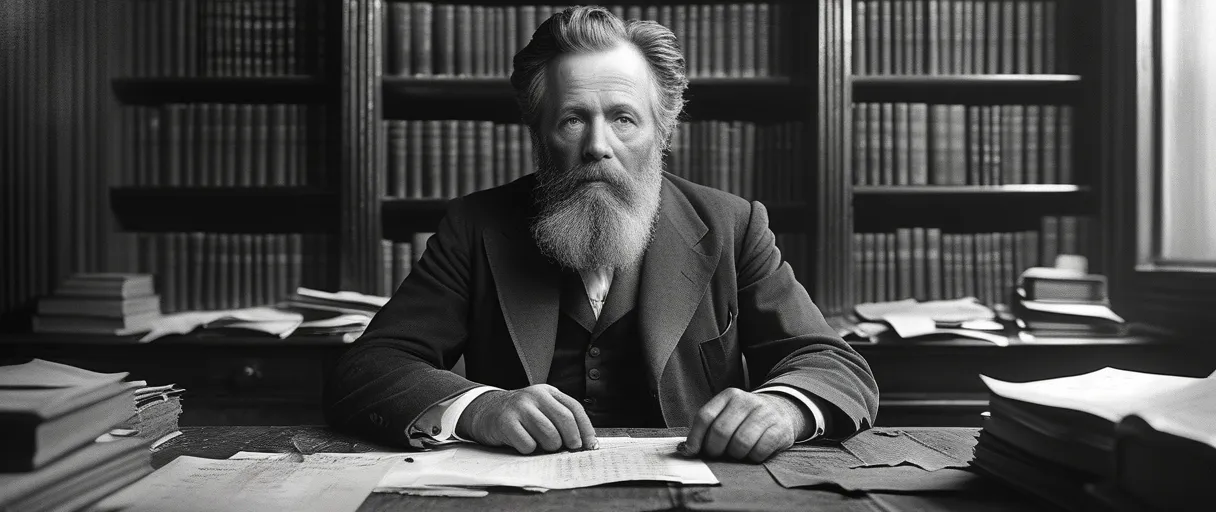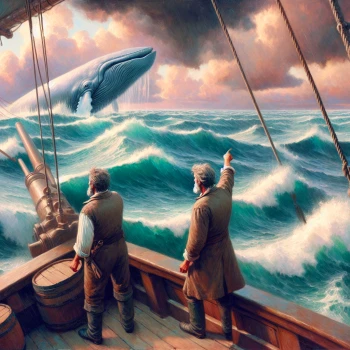
Herman Melville
Herman Melville was an influential American novelist renowned for "Moby Dick," exploring existential themes, moral conflicts, and human nature through evocative storytelling.
Notable Works
Herman Melville is most celebrated for his monumental masterpiece, "Moby Dick," a profound exploration of obsession, revenge, and humanity's struggle against nature. Considered a cornerstone of American literature, this epic novel blends elements of adventure, philosophical inquiry, and sea narrative, transcending traditional genre boundaries. At its center is the unforgettable Captain Ahab, an enigmatic and driven character whose relentless pursuit of the elusive white whale symbolizes humanity's complex and often destructive desire to conquer the unknown.
Melville also earned acclaim for shorter works like "Bartleby, the Scrivener," a poignant and enigmatic short story that delves into themes of alienation, individuality, and passive resistance. His narratives often explore the conflict between individual will and societal expectations, confronting readers with the complexities of moral and existential dilemmas. Through these influential works, Melville continues to captivate readers, inviting them to reflect on timeless human concerns and the mysteries beneath the surface of everyday existence.
Books by Herman Melville
Overview & Analysis
Herman Melville was a profound American novelist and philosophical thinker whose literary career flourished during the mid-19th century. Best known for his masterpiece "Moby Dick," Melville's works delve deeply into themes of existential contemplation, moral complexity, and the intricate struggles of human nature. His narratives frequently confront the turbulent intersections of ambition, obsession, ethical integrity, and personal loyalty. Melville critically examined societal norms, class structures, and capitalist morality, reflecting the broader transformations of his era. His distinctive literary voice, characterized by rich symbolism, vivid imagery, and profound psychological insight, challenged established institutions and conventional ideologies, embodying elements of Christian anarchism and pacifism. Melville's lasting influence is evident in the enduring relevance and interpretative depth of his characters, notably Captain Ahab, whose obsessive quest against the white whale symbolizes humanity's eternal struggle with existential questions and moral dilemmas. Through his evocative storytelling and philosophical depth, Melville continues to profoundly impact literature and cultural discourse, inviting readers to explore the complexities of the human spirit.
Back to TopInfluences & Worldview
Herman Melville was a profound philosophical thinker whose literary works reflect deep engagement with existential questions, moral complexities, and the intricate dynamics of human nature. Living through the mid-19th century, Melville witnessed significant social and economic transformations in America, prompting him to critically examine class structures, capitalist morality, and societal norms. His masterwork, "Moby Dick," exemplifies his exploration of internal moral evolution, highlighting the profound struggle within individuals between ambition, obsession, and ethical integrity. Melville's narratives often challenge established institutions and conventions, revealing a strong current of Christian anarchism and pacifism, advocating a society guided by deeper moral principles rather than institutional laws. Through character-driven storytelling, Melville vividly portrays the nuanced journey of personal integrity, loyalty, and internal conflict, ultimately offering insightful commentary on the human condition and society at large.
Notable Characters
Herman Melville is renowned for creating complex and introspective characters who grapple with existential questions and profound moral dilemmas. Captain Ahab, from Melville's magnum opus "Moby Dick," epitomizes the author's exploration of obsession and the destructive power of vengeance. Ahab's relentless pursuit of the white whale symbolizes humanity's eternal struggle against nature, fate, and self-destructive impulses, reflecting Melville's contemplation of human limits and destiny.
Similarly, Ishmael, the reflective and philosophical narrator of "Moby Dick," embodies Melville's keen interest in examining the nature of existence, spirituality, and the human condition. His thoughtful introspection and empathetic observations create a lens through which readers experience the profound depths of Melville's thematic explorations.
Melville's characters frequently embody traits of introspection, obsession, and existential inquiry, mirroring the intellectual and moral uncertainties prevalent in his era. Through these vivid character portrayals, Melville captures the essence of human struggle, morality, and the complexities of navigating a rapidly changing world in the mid-19th century.
Back to TopThemes of Focus
Herman Melville frequently explored themes of obsession and humanity's struggle against the uncontrollable forces of nature. In his most renowned work, Melville vividly illustrates the destructive power of obsession, depicting how fixation can consume one's identity and lead to ruin. Equally prominent is Melville's contemplation of the limits of human knowledge and control, portrayed through characters who challenge or attempt to master the vast, indifferent natural world, ultimately confronting their own insignificance.
Secondary themes such as isolation and existential questioning further deepen Melville's narrative explorations. Isolation reinforces the destructive nature of obsession, as characters often become disconnected from society in their relentless pursuits. Existential questioning, on the other hand, complements the theme of humanity's struggle against nature, as characters grapple with their purpose and place in an incomprehensible universe. These themes reflect Melville's own worldview, shaped by the uncertainties and philosophical introspection of the 19th century, as well as by the Romantic literary movement's emphasis on individualism, emotional depth, and the sublime forces of nature.
Back to TopLegacy & Impact
Herman Melville's profound influence on literature, philosophy, and social critique endures powerfully through his complex narratives and exploration of existential and moral themes. Initially overlooked during his lifetime, Melville's literary genius, particularly showcased in "Moby Dick," has since been recognized as pioneering in its psychological depth and philosophical scope. His work rigorously examines humanity's internal conflicts, moral ambiguities, and societal structures, influencing countless authors and thinkers in literature, philosophy, and political theory.
Melville's themes of obsession, moral integrity, and resistance to institutional authority remain strikingly relevant, resonating strongly in contemporary discourse on individualism, capitalism, and social justice. His nuanced portrayal of humanity's struggle with ethical dilemmas and existential questions continues to inspire critical scholarship, literary analysis, and philosophical debate. In academia, Melville's writings are widely studied, not only for literary merit but also for their incisive commentary on society and human nature.
Today, Melville's legacy is celebrated through diverse adaptations in film, theater, and literature, reflecting ongoing cultural interest and scholarly engagement. Although his works have occasionally sparked debate regarding their interpretations and perceived ideological positions, Melville remains a pivotal figure whose literary and philosophical contributions are integral to understanding modern society and the human condition.
Back to TopConclusion
Herman Melville's insightful exploration of human nature and moral complexity continues to resonate deeply in contemporary society, underscoring the timeless relevance of his literary contributions. His profound philosophical inquiries, embedded within intricate narratives like "Moby Dick," have significantly influenced literary traditions, inspiring generations of writers to delve into themes of existential struggle, ethical integrity, and societal critique. Melville's courageous examination of institutional structures and his advocacy for personal morality and pacifism remain strikingly pertinent today, prompting readers to reflect critically on their own values and societal roles. Engaging with Melville's works not only provides an enriching literary experience but also fosters a deeper understanding of humanity's enduring challenges and aspirations. Thus, exploring his stories today continues to offer meaningful insights, guiding readers toward greater empathy, introspection, and moral awareness.
Back to Top